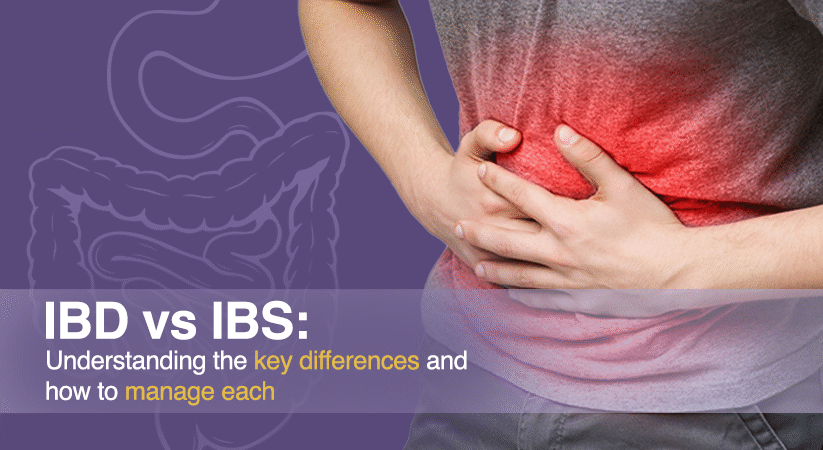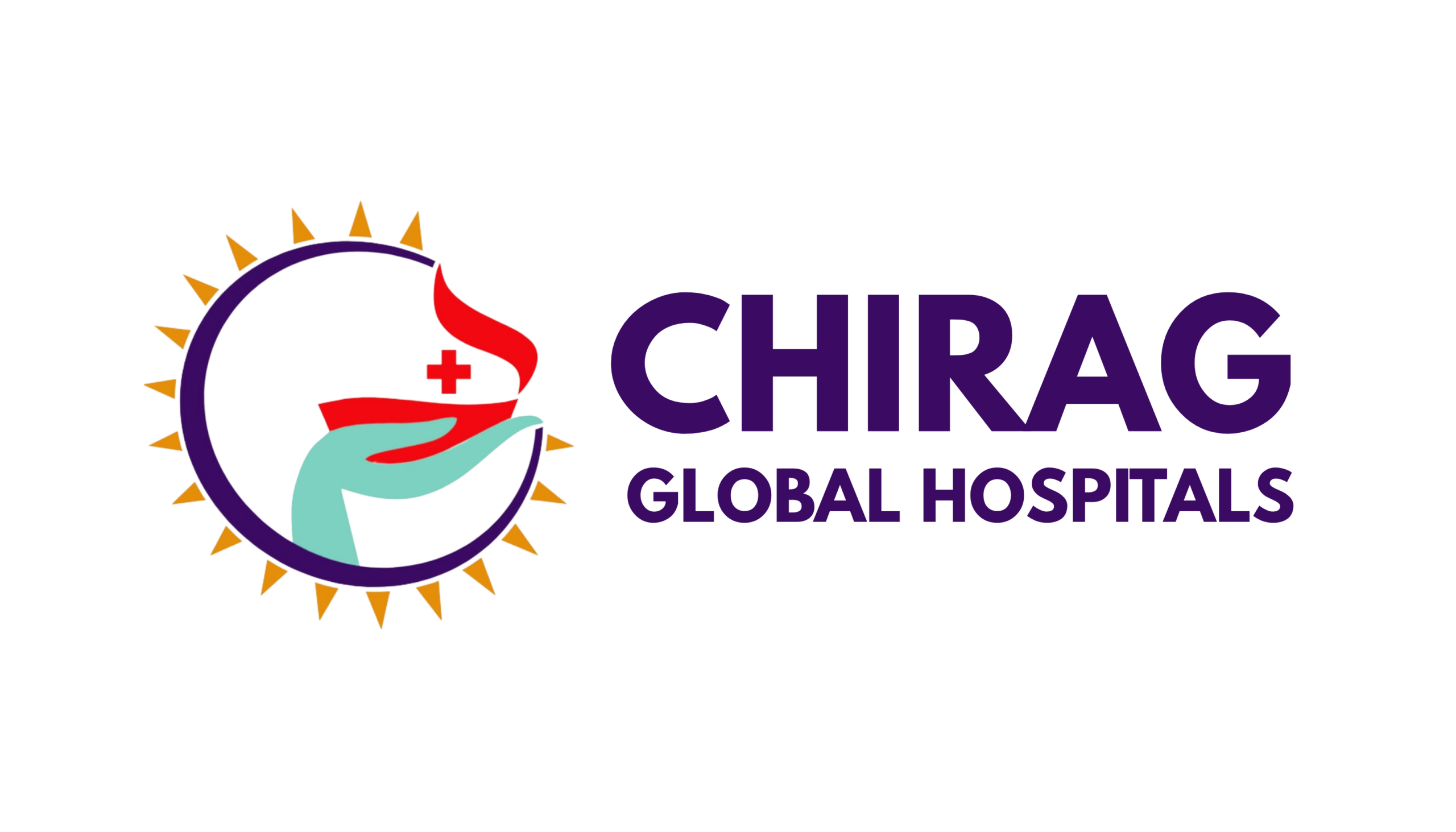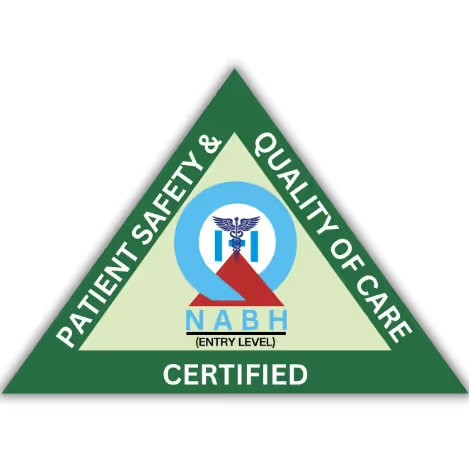By Chirag Global Hospitals

Introduction to IBS and IBD
IBS (Irritable Bowel Syndrome) is a gut-brain axis functional disorder. It impacts the functioning of the digestive system but doesn’t result in structural harm or inflammation. The symptoms are varied and usually accompany stress or eating.
IBD (Inflammatory Bowel Disease) is a long-term inflammatory autoimmune disease, typically Crohn’s disease or ulcerative colitis. It entails true inflammation and damage to the lining of the gut and may extend to the whole gastrointestinal tract.
IBS is all about malfunction (no destruction of tissue), while IBD is characterised by chronic inflammation and architectural changes. IBD can have systemic implications; IBS usually doesn’t. Let’s understand the differences in detail.
Symptoms of IBS
- Cramping,
- Bloating
- alternating diarrhoea and/or constipation.
- Pain in the abdomen usually relieves after a bowel movement.
Symptoms of IBD
- Frequent diarrhoea, commonly long-standing
- Bloody stool or rectal bleeding
- Weight loss and tiredness
- Extra-intestinal complications: joint pain, skin problems, eye inflammation
- IBD is a chronic condition that can present with acute flare-ups, with risks such as anaemia, fever, and considerable weight loss.
Causes and Risk Factors
- IBS aetiology: It may be due to a hypersensitive gut-brain axis, changed gut motility, and microbiome alterations. Its underlying cause is still not well defined.
- IBD aetiology: IBD is considered an immune-mediated condition involving genetic susceptibility, dysregulated immune responses, and environmental triggers such as infections, diet, or microbiome changes.
- Common provoking factors: Stress and some foods can exacerbate symptoms. IBS is primarily functional, whereas IBD arises from inflammation and immune dysregulation.
Diagnosis Process
IBS is typically diagnosed based on symptom criteria and the exclusion of other diseases, as no structural defect is typically anticipated.
Tests employed can include:
- Detailed patient history
- Physical exam
- Routine blood and stool tests (to exclude infection or inflammation)
- Occasionally, a colonoscopy is recommended if alarm features are present
IBD needs concrete evidence of inflammation and damage through:
- Blood markers (CRP, ESR)
- Stool calprotectin
- Colonoscopy with biopsies
- Imaging (MRI, CT) or capsule endoscopy for upper GI involvement
Treatment Options
IBS: IBS requires dietary changes. Low FODMAP is evidence-based and known to be effective in relieving IBS symptoms, especially when followed under dietitian guidance. Dietary interventions should be individualised, as triggers vary between patients. Some of the medications offered include antispasmodics, laxatives, and antidiarrhoeals, along with neuromodulators (e.g. low-dose antidepressants). Stress management through mindfulness and relaxation therapies. For some patients, cognitive behavioural therapy may be needed. Microbiome-focused therapies aimed at the gut-brain axis are also emerging to address IBS.
IBD: Anti-inflammatory medications such as 5-ASA, corticosteroids, immunomodulators, biologics, and small molecules are commonly used. Surgery may be needed in severe cases when strictures, fistula, or refractory disease are present.
For managing both IBS and IBD, dietary changes and lifestyle modifications are crucial. A supportive diet, anti-inflammatory foods, and proper removal of toxins that trigger can be recommended by a trained Ayurvedic doctor.
Impact on Quality of Life
IBS and IBD have a significant impact on daily life. IBS can lead to embarrassment and distress; IBD might encompass uncertainty, multiple hospitalisations, and possible surgery
Coping mechanisms include:
- Partake in support groups (online or in the local area)
- Obtain psychological support
- Create symptom-tracking and tailored wellness plans
Diet and Nutrition
What you eat plays a major role in how your gut responds. So, dietary changes are necessary to soothe the gut and avoid the triggers.
IBS:
- Low-FODMAP diet has evidence that it works for patients with IBS
- Symptoms may be alleviated by probiotics (e.g. B. infantis, L. plantarum).
- Patients may also benefit from nutritional support under a registered dietitian to tailor the diet according to disease phase (flare vs remission), nutritional deficiencies, and prakruthi.
IBD:
- One diet does not suit all, but balanced anti-inflammatory meals are advocated.
- Probiotics, prebiotics, and symbiotic have promise in promoting remission maintenance.
- Microbiota therapy (FMT, live bio therapeutics) is actively under investigation.
Prevention and Long-term Management
Both conditions are helped by:
- Ongoing medical review
- Stress management
- Exercise and sleep hygiene
- Individualised dietary approaches
Warning symptoms that require medical evaluation are fresh blood in stools, unintended weight loss, severe constant pain, or systemic signs and symptoms like fever. If you notice any of these, don’t ignore them and consult a doctor immediately.
New Research and Advances
The field of gastroenterology is growing rapidly, and recent breakthroughs offer hope for patients with IBS and IBD. Some of the recommendations include:
- Postbiotics: Bioactive substances, such as butyrate, strengthen the gut lining and decrease inflammation in both conditions
- Precision microbiome therapy: FMT and specific bacteria are promising, particularly in IBD
- Digital health: Gut-brain axis therapies and digital CBT platforms are emerging.
- New diagnostics: Meta Panel (Australia) detects pathogens causing GI flares, directing targeted therapy
- Clinical events: The Feb 2025 Crohn’s & Colitis Congress highlighted microbiome and digital therapies as future therapeutic directions
Conclusion
IBS and IBD are two very different conditions, but they can deeply affect daily life. IBS is a functional disorder optimally treated with diet, stress management, and symptom relief. On the other hand, IBD is a severe inflammatory disease that needs anti-inflammatory treatments and occasionally surgery. Understanding their causes, symptoms, and treatments helps you devise a healthcare plan that works for you. Early diagnosis and personalised care can make a significant difference in your quality of life.
Gastroenterologists at Chirag Global Hospitals, in collaboration with Ayurvedic doctors from the Chiraayu wing, offer comprehensive and personalised care for patients with IBD and IBS. This integrative approach combines evidence-based modern medicine with Ayurvedic therapies, including Panchakarma, to detoxify the body, enhance metabolism, and address the root causes of disease while providing symptom relief and dietary guidance tailored to individual needs




